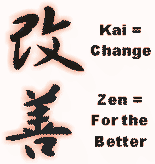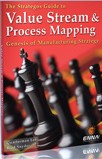Origins and Definition of Kaizen
 In the U.S. kaizen is often synonymous with "Kaizen Blitz" or
"Kaizen Event." Such events rapidly implement
workcells, improve setups or streamline processes. However, a better Japanese word for this
activity is kaikaku In the U.S. kaizen is often synonymous with "Kaizen Blitz" or
"Kaizen Event." Such events rapidly implement
workcells, improve setups or streamline processes. However, a better Japanese word for this
activity is kaikaku
In Japanese, the definition of Kaizen is "improvement" and particularly, "Continuous
Improvement"-- slow, incremental but constant. Norman Bodek explains this and translates
it as "Quick & Easy Kaizen".
Taiichi Ohno and Shigeo Shingo developed both kaizen versions at Toyota. They are important
tools for Lean Manufacturing, the Toyota Production System (TPS), Just In Time (JIT) and other
effective manufacturing strategies.
Large-Scale Vs. Small-Scale Improvement
Large scale improvement is attractive. It promises quantum jumps in productivity, quality and
effectiveness. However, it is difficult to implement because it affects many areas, people and
processes. The design must be near-perfect because failure courts disaster. The risks and
difficulties work against large-scale improvements.
Small-scale improvements are easier and faster. The risks are low because they generally have
limited effect. However, the accumulated effect is often greater than a single large
improvement. The Kaizen Blitz is a localized, smaller scale improvement and Mini-Kaizen are very
small-scale improvements.
|
The Kaizen Blitz
 The Blitz or Event is a focused, intense,
short-term project to improve a process. Substantial resources- Engineering, Maintenance,
Cell Operators, and others are available for immediate deployment. The Blitz or Event is a focused, intense,
short-term project to improve a process. Substantial resources- Engineering, Maintenance,
Cell Operators, and others are available for immediate deployment.
An event usually includes training followed by analysis, design, and re-arrangement of a
product line or area. A consultant often orchestrates. The Event normally takes 2-10 days. The
results are immediate, dramatic and satisfying.
Mini Kaizen
Before the recent popularity of the Blitz, kaizen meant "Continuous Improvement." This is the
slow accumulation of many small developments in processes and quality that, over 50 years, has
helped make Toyota the lowest cost and highest quality automobile company in the world. Let's
call these improvements "Mini Kaizen."
Mini Kaizen is part of corporate culture. It requires both conscious and sub-conscious
thinking about improvements day by day and minute by minute on the part of all employees. It
also requires that these same employees possess the skills for this type of thinking.

The mini variation is far more difficult to keep up and takes much longer for results than a
blitz. But, as Toyota has demonstrated, it offers a more sustained competitive advantage.
|





